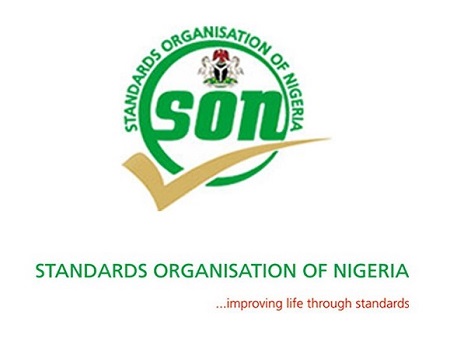The Standards Organization of Nigeria (SON), the body given the responsibility of ensuring that products manufactured within the country and products imported into the country meet quality standards, has been trying to curb the menace of substandard products, although it is a hard nut to crack.
This is to safeguard the health and safety of the citizens of the country and SON works hand-in-hand with the National Agency for Food and Drug Administration and Control (NAFDAC) and the Nigerian Customs to evaluate products being brought into the country and produced within the country.
These organisations would have solved about 55 per cent of this problem now if they were to be properly funded by the government, if goods produced in Nigeria are considered to be quality rather than the imported ones, and if corrupt leaders would stop stealing these funds.
Nigeria loses about N15 trillion to fake goods annually and is ranked amongst the world’s highest market for fake and substandard goods. Fake and substandard products span all categories of items from drugs, electricals, electronic household appliances, building materials, tyres and tubes, automobiles, machine spare parts, food and machines, to mention a few, and they still find their way into the Nigerian market.
Makinde vs Adelabu: Confusion as APC, PDP celebrate Appeal Court ruling in Oyo
Nigeria’s recession has crippled a lot of business activities, causing producers to reduce the quality of their products. Goods are also springing up everywhere in the country, most without authorisation, especially skin care products.
These bodies should stand up to the task of sensitising the public, especially those in the rural communities, on which goods to buy and how to confirm its authenticity and traceability, that is, Product Authentication Mark (PAM).
They should tighten their checks on imported goods at the ports before they are distributed because it is almost impossible to stop the harm after the goods distribution. The steady influx of substandard tyres, spare parts and drugs has caused great harm to the people of Nigeria. Causing great losses to businessmen and a regular visit to the hospital by buyers.
SON, NAFDAC and Customs need highly trained personnel as activities of those involved in substandard products are becoming more technical. The establishment and equipping of more laboratories should reduce the workload on existing ones. This will enable effective and efficient testing of goods.
They should also partner with bodies capable of helping to curb this menace. NAFDAC on its own has intensified efforts, introducing nationwide campaign in schools and plans to expand mobile technology approach, takes fight to its grassroots through its Young Pharmacists Group (YPG).
The continuous proliferation of fake and substandard drugs in the Nigerian market has generated increased concerns by most stakeholders in the health sector as they have been considered a global threat to human lives, leading to treatment failure, organ dysfunction or damage, worsening of chronic disease conditions and the death of many Nigerians.
Though NAFDAC has advocated the passage of the bill, which seeks life imprisonment, confiscation of assets and compensation of victims on conviction, it has not been passed yet by the Senate.
These bodies should do more to stop the sales and importation of these substandard products so as to enable a better living for Nigerians. Government should also encourage Nigerians to produce quality products which should also be exported to other nations of the world.
Victoria Ukpong
vickyukpong98@gmail.com
WATCH TOP VIDEOS FROM NIGERIAN TRIBUNE TV
- Relationship Hangout: Public vs Private Proposals – Which Truly Wins in Love?
- “No” Is a Complete Sentence: Why You Should Stop Feeling Guilty
- Relationship Hangout: Friendship Talk 2025 – How to Be a Good Friend & Big Questions on Friendship
- Police Overpower Armed Robbers in Ibadan After Fierce Struggle






